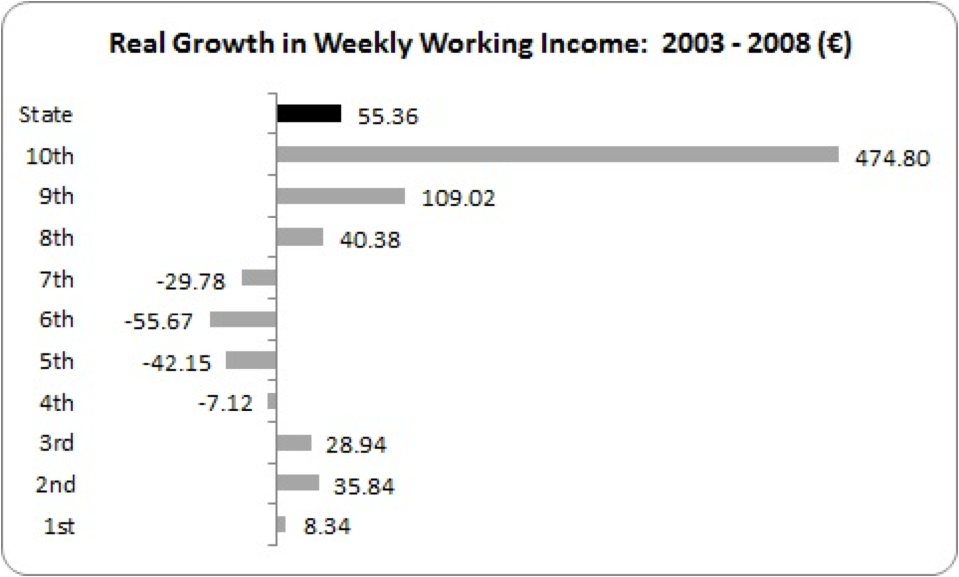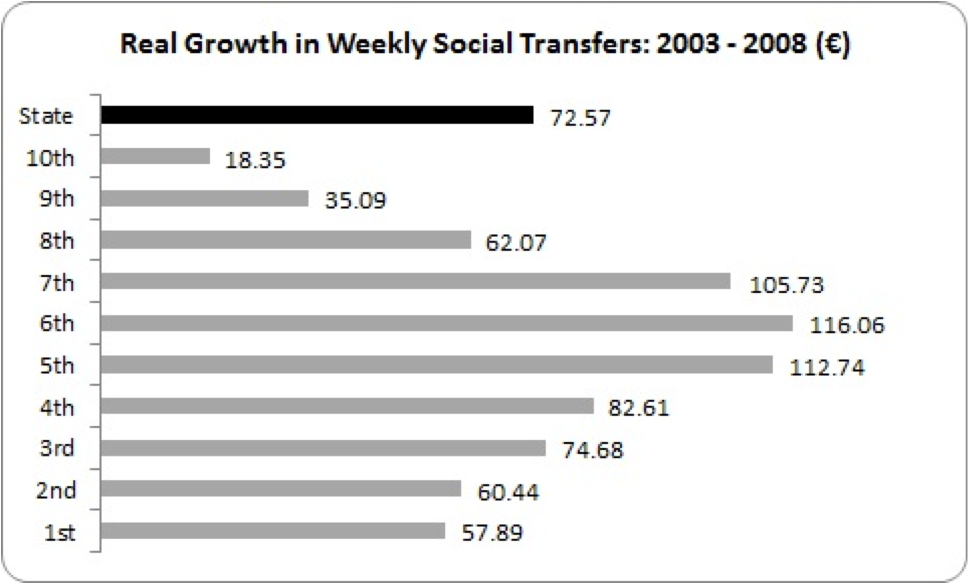Party nation

Attacks on the social welfare system are really just veiled attacks on all of us. By Michael Taft.
Remember that line – how during the boom years we all ‘partied’ as a nation? Remember those prescriptions – how we had to cut back our living standards, probably back to 2003, in order to restore competitiveness? Remember how we were told that we were living beyond our means and now we had to purge (and purge and purge). With the an all-important seminar on incomes and recovery being hosted by TASC in Cork on Thursday, let’s see just how much we partied, how we lived beyond our means, how much – as a nation – we indulged at the table of plenty.
We’ll use the CSO’s Survey on Income and Living Conditions from 2003, the first year of publication, to 2008, the last year of income growth. Let’s chart the growth in real direct household income (i.e. after inflation) by deciles. Direct income includes PAYE and self-employed earnings plus income from rent, interest, private pensions and dividends.

There are some surprising results. Income from work increased nationally by €55 per week. The top 10% experienced an increase of €475 per week – nearly nine times the national average. Of course, this should be expected – the more you have, the more you get.
At the poorer end, households saw their real weekly income rise – helped by increases in the national minimum wage and the wage floors in the Joint Labour Committee sectors (e.g. retail, hospitality, hairdressing, etc.).
What is surprising, though, are the middle deciles. These households – which make up over 40% of adults in the state – experienced real losses. Even in the relatively high 8th decile the income growth was only 3% in real terms over five years.
This doesn’t seem to tally with our experience – middle-income households experiencing a fall in working income. Didn’t all our incomes grow? Didn’t we all party? The answer to this is equally surprising.
Here is the growth in household social transfers between 2003 and 2008 in real terms. Social transfers include the gamut of social protection (welfare) programmes from unemployment and disability payments to family allowances, including Child Benefit, housing allowances and state old age pensions.

We tend to think of social welfare as something for the ‘poor’. However, as can be seen – the biggest gainers, in nominal terms, were those in the middle deciles. Even those in the 8th decile had a greater benefit from social transfers than they did from working income. Needless to say, the top 10% were the smallest beneficiaries of increased social transfers.
In short, living standards for those in the middle deciles were raised – not by work – but by social protection measures.
This leads us to some tentative conclusions:
- First, the attack on social welfare is not just an attack on the ‘poor’ (though it is that in spades). It is an attack on the living standards of the great majority of households in the state.
- Second, the agenda that pits working people against the unemployed and lone parents is an attempt to disguise the general attack on living standards. This is a divide and rule strategy – and after watching and listening to current affairs programmes, it is working a treat.
- Third, those in the lower categories are currently suffering two-fold: the attack on social welfare and the attack on wages through Minister Bruton’s attempt to carve gaping holes in the wage floors covered by Joint Labour Committees.
Of course, there is one group that is affected by neither the attacks on social transfers or wage floors: the top 10%. Funny that.
And all this should lead us to an alternative analysis and new strategies: namely, that social protection is just that – protecting society. We must construct strategies that unite the great majority of households and show that attacks on the social welfare system are really just veiled attacks on all of us. Yes to reform, yes to efficiency, but also: yes to expansion.
In short, we should be arguing for a social welfare system that is truly concerned with the welfare of society.
It is socially equitable and economically rational.
Image top: Pinti 1.
{jathumbnailoff}
